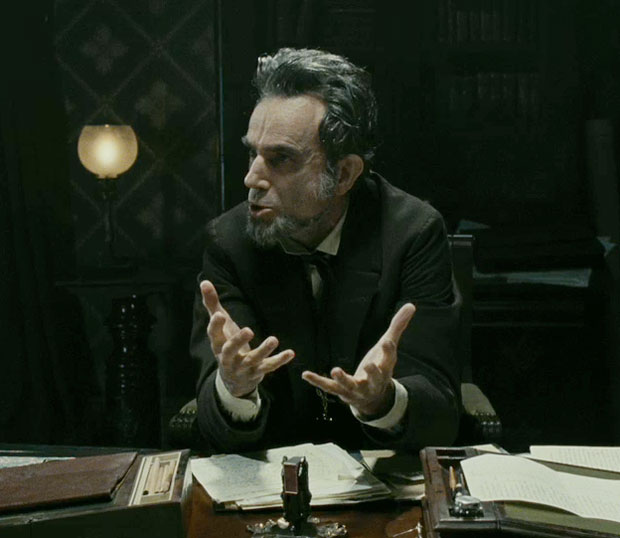 Have you seen Steven Spielberg‘s epic new film, Lincoln? If not, you may be in for a surprise when you see it—many people seem to have quite an unnerved reaction to Daniel Day-Lewis‘ interpretation of Honest Abe’s vocal presentation. Day-Lewis is known for his incredible commitment to his acting roles (oh those Method actors!), and spent a long time crafting the voice that spoke to him as Lincoln’s. The resulting tone and inflection was unexpected: higher-pitched, and ever-so-slightly reedy during the times Lincoln wasn’t impassioned by his own convictions. And for that, many are confused and upset by Day-Lewis’ choice to register Lincoln on the higher end of the spectrum. So many imagine (and expect) instead the deeper tones past interpretations have yielded.
Have you seen Steven Spielberg‘s epic new film, Lincoln? If not, you may be in for a surprise when you see it—many people seem to have quite an unnerved reaction to Daniel Day-Lewis‘ interpretation of Honest Abe’s vocal presentation. Day-Lewis is known for his incredible commitment to his acting roles (oh those Method actors!), and spent a long time crafting the voice that spoke to him as Lincoln’s. The resulting tone and inflection was unexpected: higher-pitched, and ever-so-slightly reedy during the times Lincoln wasn’t impassioned by his own convictions. And for that, many are confused and upset by Day-Lewis’ choice to register Lincoln on the higher end of the spectrum. So many imagine (and expect) instead the deeper tones past interpretations have yielded.
So what does it mean, and who’s right? Well, it’s a complicated question with no real answer. Lincoln was a large man, stature-wise. He was tall and did no small deed in ending the Civil War and abolishing slavery—if any modern president did even one of those things, you’d never hear the end of it in their reelection ads—so the resonance of his words, his iconic speeches, hold a lot of weight to them. And when people think of what really drives those things home, they think of a deep, booming baritone. Something that says “manly” and “in control” without explicitly having to say it. A voice that comes from deep within and is readily able to carry the weight of the mighty and historic words Lincoln bestowed upon our nation all those years ago.
And, not surprisingly, that’s what many of the prominent politicians of the day had: big, booming voices to help impassion the electorate; to sway those unsure to their side. Having a commanding voice is certainly effective. However, this is not what Lincoln had, at all—perhaps another reason why many were so surprised of his trajectory from relative unknown to the 16th President of these United States. It’s certainly easier for us to imagine a voice that resonates as deeply as Lincoln’s words—the man has become so romanticized and idealized throughout history. But in fact, Lincoln’s tone was more of a tenor than a bass: a surprise to many.
It’s not all perception, though: several actors have played Lincoln in the past, and have all done a deeper-voiced Lincoln, further exacerbating the seemingly-misguided perception. Deep-voiced Gregory Peck took on Abe in the TV miniseries The Blue and The Gray. Henry Fonda also played the man in Young Mr. Lincoln. Raymond Massey took the low-toned approach in his Oscar-winning turn as Abe in Abe Lincoln in Illinois. Walter Huston did the same in the 1930 film Abraham Lincoln, and the portrayal of Lincoln on Star Trek (played by Lee Bergere) was no different in this regard.
Probably one of the few to get closest to it before Day-Lewis, also had a part in the Spielberg take: Hal Holbrook (who plays Preston Blair in Lincoln) played Abe twice. Once, in the 70s on the Carl Sandburg-penned TV series Lincoln, and again in the miniseries North and South in the 80s. Take a peek at the videos below to see how the man has been vocalized throughout film history.
Gregory Peck
Raymond Massey
Walter Huston
Henry Fonda
Hal Holbrook
According to an interview with the The Smithsonian, leading Lincoln scholar Harold Holzer explained that “Lincoln’s voice, as far as period descriptions go, was a little shriller, a little higher … People said that his voice carried into crowds beautifully. Just because the tone was high doesn’t mean it wasn’t far-reaching.”
Perhaps it was this that inspired Day-Lewis in his own quest to find the voice of a man who completely changed American history. Which is—let’s be frank—no easy task. Especially when there’s already an image (albeit slightly inaccurate) of the man that is well-established in popular culture as the de-facto interpretation. It would’ve certainly been easier for him to pick a low, booming voice to deliver his words, but in a film so obsessed with historical accuracy (Spielberg has noted several times in the past that he was hell-bent on being as accurate as possible with every aspect of the film—right down to the wallpaper), getting the voice right outside of preexisting tropes, was of the utmost importance. Day-Lewis recently explained the process of finding Lincoln’s voice in an interview (seen below).
So, if descriptions of Lincoln suggest that his voice was more in-line with what Day-Lewis presents in Lincoln than anything else, why is it so hard to believe? Well, it paints a nicer overall image if Lincoln had as weighty a voice as his words. The human mind will always romanticize those who’ve changed the world for the better. Holzer explains it further to CBS News, saying “Lincoln died long before audio recording was possible so we have no hints about what he really sounded like, except the reminiscences of his contemporaries. The most frequent things we read are that he had a nasal, high voice that somehow miraculously floated over large crowds.”
Getting the visuals of Lincoln was easy—as he was amply photographed throughout the years of his presidency. And while it may be more romantic to picture this extremely tall man, with his angular face, distinctive top hat and facial hair to come with a voice bigger than himself, it was not the truth as many accounts of the man present. And while we know that Honest Abe certainly wasn’t a vampire hunter (sorry, Benjamin Walker), we hold these truths to be self-evident: that not all vocal cords are created equal. But that doesn’t make a man less of a historical icon—sometimes you need something a little unexpected to really get the job done. It’s not the sound of the words, but the way you wield them, that provides the most power.
[Photo Credit: 20th Century Fox]
Follow Alicia on Twitter @alicialutes
More:
‘Lincoln’ International Trailer: A Rousing Pre-Election Preview
David Oyelowo on Daniel Day-Lewis in ‘Lincoln’: It Was ‘Like Going in a Time Machine’
‘Lincoln’ Wins the First Presidential Debate of 2012 — TRAILER
From Our Partners:
(Moviefone)




